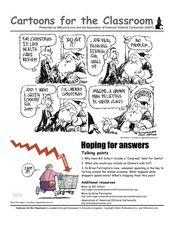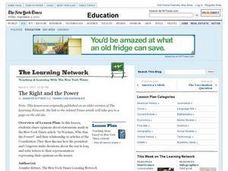Curated OER
Powers of Congress
Have your class fill out this comprehension sheet while reading about the powers of Congress. There are ten multiple choice questions focused on the rights, powers, and limitations of Congressional law.
College Board
Balance of Power Between Congress and the President
Three branches of government help create a system of checks and balances. A helpful resource provides a series of articles regarding the balance of power between the legislative and executive branches of government. Historians answer...
Curated OER
Powers of Congress: The Scope of Congressional Powers
Use this as a quiz or to guide reading. There are five true/false and five multiple choice questions for the class to answer. Topics covered relate to the type of power Congress has and the constructionists movement.
National Endowment for the Humanities
The "To Do List" of the Continental Congress
What is on your to-do list today? The second lesson of a three-part series on Lost Heroes of America investigates the laundry list of items in front of the second Continental Congress. Scholars research, analyze, and present information...
Curated OER
Cartoons for the Classroom: Congress and the President
Learners take a critical look at the ways in which the president interacts with Congress in order to make political and economic decisions. They use a series of well-constructed discussion questions to guide their thinking as they...
C-SPAN
Choice Board: Expressed and Implied Powers
Article 1, Section 8 of the United States Constitution expressly lists powers given to Congress. Over the years, lawmakers have expanded the enumerated powers to include powers implied by the list. To better understand the significance...
American Bar Association
What Is Separation of Powers?
Who has the power? Scholars investigate the creation of the three branches of government in the United States Constitution. They analyze just why the framers created the branches the way they did.
Beverly Hills High School
Congress of Vienna 1815
Europe was changing in the early nineteenth century, and the Congress of Vienna largely sought to slow and contain those sweeping changes. A slideshow presentation illustrates the details of the Congress of Vienna, including its three...
Curated OER
Congress, The Implied Powers: Ch 11
Congress has both implied and expressed powers. Quiz your kids on which powers are expressed, which are implied, and examples of both. Included are 5 true/false and 5 multiple choice questions.
Heritage Foundation
Congress's Territorial Powers, Implied Powers, Citizenship, and the Bureaucracy
An informative resource gives scholars a look into why the US Constitution placed certain federal powers over that of the state. A variety of activities about constitutional clauses helps to create meaningful learning.
US House of Representatives
Legislative Trends and Power Sharing Among Hispanic Americans in Congress, 1977–2012
Bilingual education, voting rights, and Congressional redistricting come up often in the news. Explore these topics from another view—the perspectives of Hispanic members of Congress. Activities include an article with comprehension and...
iCivics
Mini-Lesson: Veto Power
No means no! Scholars analyze the impact of one of the president's most powerful tools—the veto—while also finding out ways to properly check facts for validity. They research the power of the presidential veto with paired activities and...
Curated OER
Why Does Congress Work That Way?
Students discover the powers of Congress. In this legislative branch lesson, students examine the legislative process as they analyze Article I of the U.S. Constitution. Students consider the powers of Congress as they define the role of...
Curated OER
Simplified United States Constitution and Bill of Rights
A good handout is a great find. Print this resource and hand out a simplified version of the US Constitution and Bill of Rights to your US government or US history class. The powers of the president, Congress, and the Senate are...
iCivics
Congress
Through reading materials, worksheets, and a primary source activity, this resource provides an overview of the structure and powers of the legislative branch of government in the United States. Readings review how a bill becomes a law,...
National Endowment for the Humanities
Lesson 2 James Madison: The Second National Bank—Powers Not Specified in the Constitution
How much power is too much power for the federal government? Scholars use primary documents and constitutional research in groups to analyze the creation of the Second National Bank under James Madison. This is the second lesson of a...
Curated OER
President Bush Balances Power
Students review the results of the November 2006 mid-term election. Using their text, they read the history of the balance of power and examine recent news articles. They present their findings to the class and may even hold a debate.
Curated OER
The Congress of Vienna
Established to "undo what Napoleon had done," the Congress of Vienna instituted many changes throughout Europe in the early 19th century - the details of which are included in this presentation. Maps and key decisions are outlined in...
Heritage Foundation
Congress's Economic Powers
Join Congress as they assess their economic abilities for spending—and as they discover their limits. High schoolers use an educational resource to explore Congress's economic powers and learn to apply these concepts to their everyday...
iCivics
Branches of Power
Learners take on the roles of the legislative, judicial, and executive branches of government in the United States and work to develop public policy issues and ideas into laws in this engaging and well-designed online interactive.
Curated OER
The Congress of Vienna
Here is a very brief look at the five great powers of Europe. The Congress of Vienna is not explained very well, but key players are introduced, as are their actions, goals, and legacy.
Heritage Foundation
The Powers of the Executive
Are executives as powerful as they sound? High schoolers find out about the US president and executive branch. A variety of activities include scaffolded reading sections, research assignments, and collaborative group work.
Curated OER
The Right and the Power
Students read, discuss and analyze the New York Times article "In Wartime, Who Has the Power?" and relate the article to the Constitution. They then brainstorm how the president and Congress make decisions about the war in Iraq and write...
Curated OER
Structure of Congress
Students examine the structure of Congress. They identify the roles of the Democratic and Republician parties and their leaders. They role play the role of congressmen and pretend to pass new legislation.
Other popular searches
- Delegated Powers of Congress
- Expressed Powers of Congress
- Express Powers of Congress
- Implied Powers of Congress
- U.s. Congress Powers
- Congressional Powers
- The Powers of Congress
- Powers of Congress Song
- Us Congress Powers
- Expressed Powers Congress
- Explicit Powers of Congress
- Expess Powers of Congress























